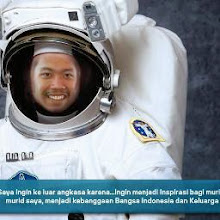"Tanpa cinta, kecerdasan itu berbahaya, dan tanpa kecerdasan, cinta itu tidak cukup."
Penulis Mengikuti Pertemuan Ilmiah dan Edukatif Mengenai Ipteks Nuklir
Economic development requires reliable, affordable electricity that is provided in sufficient quantities to satisfy the minimum energy requirements at a local, regional or national level.
As simple as this recipe for economic development appears, technological, infrastructural, financial and developmental considerations must be analysed and balanced to produce a national energy strategy.
Complicating that task is the historic fact that energy at the desired price and in the desired quantities can be neither taken for granted nor guaranteed. Energy economics and energy security determine the options available to nations working to establish a sustainable energy strategy for the future.
Seseorang pernah menulis, SIAPA yang MENGENDALIKAN AIR dan BAHAN PANGAN, DIALAH yang dapat MENGENDALIKAN MANUSIA, SIAPA yang MENGENDALIKAN ENERGI, DIALAH YANG MENGENDALIKAN BENUA dan NEGARA. SIAPA yang MENGENDALIKAN INSTITUSI KEUANGAN/FINANSIAL, DIALAH yang MENGENDALIKAN DUNIA.
Kami tambahkan siapa yang mampu mengendalikan hawa nafsu dan dirinya dialah yang akan memiliki syurga.
Penguasaan sektor-sektor strategis di bumi ini menyisakan begitu banyak keprihatinan, dimana sebagian besar aset dunia dikuasai oleh segelintir orang dan mayoritas manusia hanya menikmati sebagian kecil sumber daya di bumi ini.
Inilah yang kita perlu pikirkan bersama dan kerjakan dengan semangat pantang menyerah, mensejahterakan seluruh manusia dengan cara serta kasih-Nya.
Jika saja orang-orang yang memegang kendali sumber daya-sumber daya strategis di bumi ini memiliki hati yang penuh cinta-kasih terhadap sesama, maka dipastikan kehidupan masa depan manusia akan menjadi lebih indah.
Energy Economics
A nuclear power reactor is relatively expensive
to build but relatively inexpensive to run. That
makes it a good investment in some situations,
but not in others. It is more attractive where
energy demand is growing rapidly, where
alternatives are scarce or expensive, where
energy supply security is a priority, where
reducing air pollution and greenhouse gas
emissions is a priority, where financing is
available that can wait for longer term returns
(which is more characteristic of governments
than private industry), and where financial risks
are lower due to more predictable electricity
demand and prices, stable market structures
and strong non-partisan political support.
The 68 power reactors currently under construction around the world reflect these characteristics of favorable investment environments.
The 68 power reactors currently under construction around the world reflect these characteristics of favorable investment environments.
Energy Security
Another major consideration, in addition to
price and resource base considerations, is
energy security. The best way to strengthen
a country’s energy security is by increasing
the diversity and resiliency of energy supply
options. For many countries, expanding
nuclear power would increase diversity in
their electricity supplies.
Nuclear power has
two features that generally further increase
resiliency.
Firstly, nuclear electricity generating costs are much less sensitive to changes in fuel prices than are fossil-fired electricity generating costs.
Secondly, the basic fuel uranium is available from diverse producer countries, and small volumes are required, making it easier to establish strategic inventories.
Firstly, nuclear electricity generating costs are much less sensitive to changes in fuel prices than are fossil-fired electricity generating costs.
Secondly, the basic fuel uranium is available from diverse producer countries, and small volumes are required, making it easier to establish strategic inventories.
In practice,
the trend has been away from strategic stocks
toward supply security based on a diverse well-
functioning market for uranium and fuel supply
services. But the option of relatively low-cost
strategic inventories remains available for
countries that find it important.
Energy Choices
Countries are different. The right energy
mix for a country will depend on how fast its
energy demand is growing, on the availability
of alternatives like hydro power or shale gas,
on its financing options, and on its national
preferences and priorities as expressed in
national politics. How countries balance the
various considerations such as accident risks,
inexpensive electricity, mitigating climate
change, air pollution, jobs, and energy
import dependence is at least partly a matter
of national preference.
Sumber:
Ucapan Terima Kasih Kepada:
Kak Rezy Pradipta, Ph.D.
(Alumni Tim Olimpiade Fisika Indonesia, Belajar di Department of Nuclear Science & Engineering at MIT)
Dr. Mohamed Mustafa ElBaradei, J.S.D. (Former Director General of IAEA)
Prof. Mujid S. Kazimi, Ph.D. (Director, Center for Advanced Nuclear Energy Systems MIT)
Prof. Djarot Sulistio Wisnubroto, M.Sc., D.Sc. (Presiden BATAN)
Kak Iqbal Robiyana, S.Pd. (Founder Center for Nuclear Education at Indonesia University of Education)
Teh Nina Widiawati, S.Pd. (Mahasiswa S2 Bidang Peminatan Fisika Nuklir)
Teh Fitria Miftasani, S.Pd. (Mahasiswa S2 Bidang Peminatan Fisika Nuklir)
Dr. Petros Aslanyan, M.Sc. (Joint Institute for Nuclear Research, Rusia & Yerevan State University)
Semua keluarga dan sahabat-sahabat ku.
Terima Kasih
Semangat Semoga Bermanfaat
"Semoga setiap pembelajaran dan usaha kita di dunia ini menjadi bekal untuk bertemu dengan-Nya di Syurga kelak"
Sumber:
http://www.batan.go.id/ (BATAN)
Ucapan Terima Kasih Kepada:
Kak Rezy Pradipta, Ph.D.
(Alumni Tim Olimpiade Fisika Indonesia, Belajar di Department of Nuclear Science & Engineering at MIT)
Dr. Mohamed Mustafa ElBaradei, J.S.D. (Former Director General of IAEA)
Prof. Mujid S. Kazimi, Ph.D. (Director, Center for Advanced Nuclear Energy Systems MIT)
Prof. Djarot Sulistio Wisnubroto, M.Sc., D.Sc. (Presiden BATAN)
Kak Iqbal Robiyana, S.Pd. (Founder Center for Nuclear Education at Indonesia University of Education)
Teh Nina Widiawati, S.Pd. (Mahasiswa S2 Bidang Peminatan Fisika Nuklir)
Teh Fitria Miftasani, S.Pd. (Mahasiswa S2 Bidang Peminatan Fisika Nuklir)
Dr. Petros Aslanyan, M.Sc. (Joint Institute for Nuclear Research, Rusia & Yerevan State University)
Semua keluarga dan sahabat-sahabat ku.
Terima Kasih
Semangat Semoga Bermanfaat


























